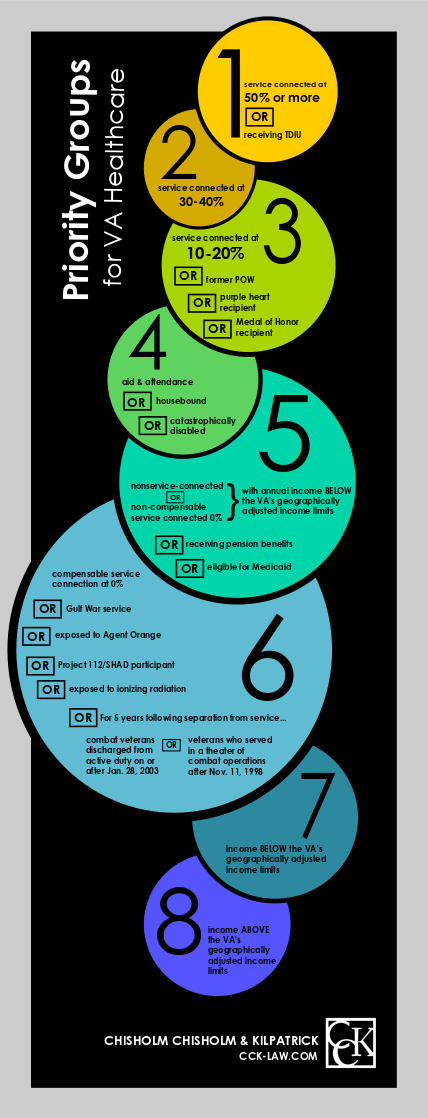Priority Groups for VA Healthcare
CCK Law: Our Vital Role in Veterans Law
VA assigns every veteran an Enrollment Priority Group to make sure that certain groups of veterans can enroll before others. When you apply for enrollment, VA will assign you a Priority Group and let you know whether you are eligible for VA healthcare in general. If you meet the requirements for more than one Priority Group, VA will place you in the highest Priority Group for which you are eligible. This is infographic is a simplified overview of each priority group.
Group 1: Service-Connected at 50% or more or receiving TDIU
Group 2: Service-connected at 30-40%.
Group 3: Service-connected at 10-20%, or a former POW, or a purple heart recipient, or a medal of honor recipient.
Group 4: Aid and attendance or housebound, or catastrophically disabled
Group 5: Nonservice- connected or non-compensable service-connected 0% (with annual income below VA’s geographically adjusted income limits) or receiving pension benefits or eligible for Medicaid.
Group 6: Compensable service connection at 0%, or Gulf War service, or exposed to Agent Orange, or Project112/SHAD participant, or exposed to ionizing radiation, or for 5 years following separation from service…( combat veterans discharged from active duty on or after Jan.28, 2003 or veterans who served in a theater of combat operations after Nov 11, 1998).
Group 7: Income below VA’s geographically adjusted income limits
Group 8: Income above VA’s geographically adjusted income limits.
Copayments
The Enrollment Priority Group you fall in to will determine whether you will be responsible for copayments for medications and different types of care at VA Medical Centers.
Group 1: Veterans in this group are not required to make a copay for inpatient care, outpatient care, outpatient medication, or extended care service.
Group 2: Copayments are required for outpatient medication, unless it is for care related to service-connected conditions, for former POWs or catastrophically Disabled Veterans.
Group 3: Copayments are required for outpatient medication. Former POWs are not exempt from copays for extended care services when the care is for a non- service-connected condition.
Group 4: Copayments are required for extended care services as well as outpatient medication. However catastrophically disabled veterans are exempt from outpatient medication copayments.
Group 5: Copayments are required for outpatient medication as well as extend care services.
Group 6: Aside from combat veterans, copayments are only required if the care or service provided is unrelated to VA’s exposure treatment.
Group 7: Copayments are required, however, the copay for inpatient care is reduced by 80% of the full rate.
Group 8: Copayments are required for impatient care, outpatient care, outpatient medication, and extended care services.
To learn more, read the full blog here – VA Healthcare Eligibility & Copays
Share this Post
